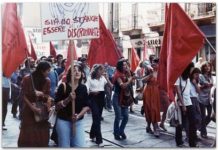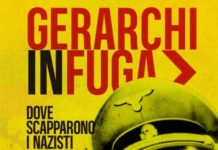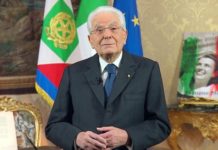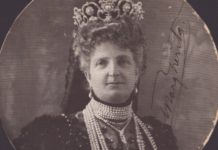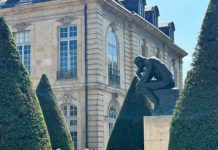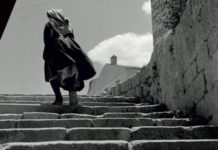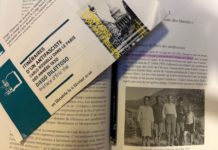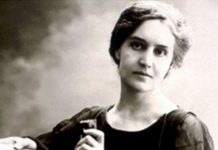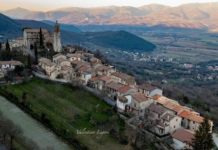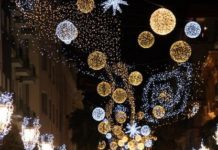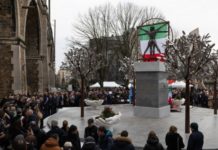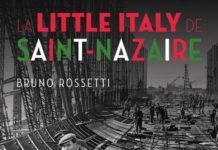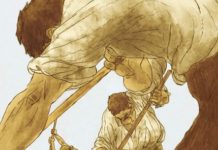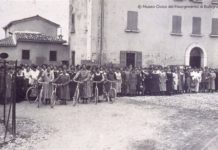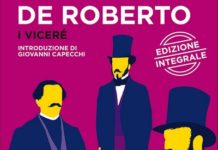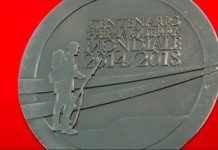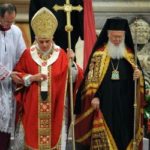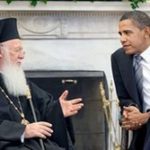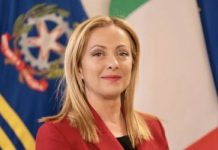Si evidenzia la drammaticità del tema “fede” oggi nel mondo ed in Europa, mentre si conclude il Natale cattolico ed incomincia quello ortodosso, tra l’aggressione a Papa Benedetto XVI, la “prigionia” del Patriarca Bartolomeo della chiesa ortodossa, che seguono il divieto di edificare minareti in Svizzera a danno della religione islamica. Una Europa sempre piena di contraddizioni che nel suo crescere appare sempre più incapace di risolvere le sue contraddizioni ed intolleranze. Vi presentiamo anche in versione italiana la riflessione pubblicata in inglese di Thomas Verakis.
We all witnessed on Christmas Eve the unexpected attack on Pope Benedict the 16th that deeply shocked the Catholic Christians as well as the general public all over the world. Fortunately, the assault on the 82-year-old Pontiff did not constitute a serious threat for his safety and health, due to the instantaneous intervention of his Swiss Guards. The Pope performed his duties and celebrated the mass of Christian Eve in the Vatican as scheduled and the public opinion was left with profound sympathy for the very reverend Church leader that experienced a rather unfortunate event on a holy day for the entire Christendom.
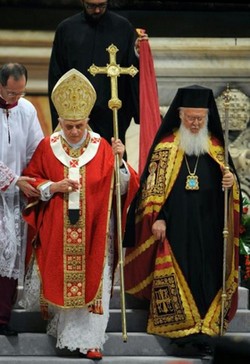 However, four days earlier the world’s mass media had presented part of the CBS’s interview with the 270th successor of St. Andrew in the throne of Constantinople (Istanbul) that was for centuries more respected and influential throughout the Christian world than his western counterpart in Rome. The relations between the two men who serve the two most ancient and historic churches of the Christian world are governed by mutual reverence and good will with regard to the dogmatic differences that have tormented and deeply divided Christianity for centuries. When the current successor of St. Peter was proclaimed Pope back in 2005 very few noticed that his first official journey abroad was in Constantinople (Istanbul) Turkey to pay an honorary visit to the Patriarch. His move was highly symbolic for two reasons: First, because it bore significance for the unity of the Churches and second, because it exalted the spiritual caliber of the forgotten and suffering Christian bishop that hosted Pope Benedict the 16th.
However, four days earlier the world’s mass media had presented part of the CBS’s interview with the 270th successor of St. Andrew in the throne of Constantinople (Istanbul) that was for centuries more respected and influential throughout the Christian world than his western counterpart in Rome. The relations between the two men who serve the two most ancient and historic churches of the Christian world are governed by mutual reverence and good will with regard to the dogmatic differences that have tormented and deeply divided Christianity for centuries. When the current successor of St. Peter was proclaimed Pope back in 2005 very few noticed that his first official journey abroad was in Constantinople (Istanbul) Turkey to pay an honorary visit to the Patriarch. His move was highly symbolic for two reasons: First, because it bore significance for the unity of the Churches and second, because it exalted the spiritual caliber of the forgotten and suffering Christian bishop that hosted Pope Benedict the 16th.
His holiness the Ecumenical (Universal) Patriarch Bartholomew who represents the approximately 300,000,000 Orthodox Christians worldwide was interviewed by Bob Simon – one of the most eminent journalists in the USA.
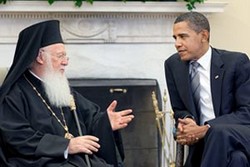 He voiced his anxious concern about the adverse social and political conditions that have been continuously and deliberately mutilating the institution of the Ecumenical Patriarchate in Turkey which pre-existed for centuries well before the foundation of modern Turkey and even its predecessor the Ottoman Empire. His holiness the Patriarch Bartholomew one of the world’s most oppressed religious leaders is restricted in an area of less than an acre of land fenced with barb wire for his security from the life-threatening insults and messages that he receives on a daily basis. His constant, alarming request to the Turkish State concerns the opening of the Theological School of Halki that legitimately belongs to the Patriarchate and whose opening will provide his flock with new clergymen that are absolutely necessary for the survival of his local Christian community and the continuation of the institution of the Christian Patriarch in Constantinople (Istanbul). The opening of the Halki Theological School is of vital importance to the Christian Byzantine-Greek minority of less than 3,000 people due to the fact that its mission focuses on the spiritual and academic preparation of clergymen that will later on serve as local bishops and who will eventually constitute the reservoir of candidates for the election of the next Patriarch who has to be -by Turkish law- a Turkish citizen (Christian Orthodox bishops of other nationalities cannot be elected). In other words, the official closing down of the Halki School by the Turkish authorities in 1971 has had the same detrimental effects for the Orthodox Church that the Vatican would experience if it were deprived of its College of Cardinals.
He voiced his anxious concern about the adverse social and political conditions that have been continuously and deliberately mutilating the institution of the Ecumenical Patriarchate in Turkey which pre-existed for centuries well before the foundation of modern Turkey and even its predecessor the Ottoman Empire. His holiness the Patriarch Bartholomew one of the world’s most oppressed religious leaders is restricted in an area of less than an acre of land fenced with barb wire for his security from the life-threatening insults and messages that he receives on a daily basis. His constant, alarming request to the Turkish State concerns the opening of the Theological School of Halki that legitimately belongs to the Patriarchate and whose opening will provide his flock with new clergymen that are absolutely necessary for the survival of his local Christian community and the continuation of the institution of the Christian Patriarch in Constantinople (Istanbul). The opening of the Halki Theological School is of vital importance to the Christian Byzantine-Greek minority of less than 3,000 people due to the fact that its mission focuses on the spiritual and academic preparation of clergymen that will later on serve as local bishops and who will eventually constitute the reservoir of candidates for the election of the next Patriarch who has to be -by Turkish law- a Turkish citizen (Christian Orthodox bishops of other nationalities cannot be elected). In other words, the official closing down of the Halki School by the Turkish authorities in 1971 has had the same detrimental effects for the Orthodox Church that the Vatican would experience if it were deprived of its College of Cardinals.
 The Byzantine-Greek element of Constantinople (recognized as an ethnic minority by the Lausanne treaty) continues to shrink worryingly (due to the ethnic cleansing practices applied in the 20th century), but never quits the struggle of survival so as to safeguard its glorious medieval past that greatly enhanced the cultural and scientific prospects of the Western European Societies during and long after the Middle Ages. The local Christian Byzantine (Rum) community – via its most revered member – sends out a clear and loud SOS message to the world and the Turkish government. This is presumably the ultimate and most desperate attempt of a modest and pious church leader to defend his Christian flock and maintain the righteous tradition of the Holy Orthodox Church in its birthplace. A great percentage of the Turkish press has already embraced with sincere sympathy the cry of despair of the Ecumenical Patriarch who is a Turkish citizen and remains in custody in his own birth land.
The Byzantine-Greek element of Constantinople (recognized as an ethnic minority by the Lausanne treaty) continues to shrink worryingly (due to the ethnic cleansing practices applied in the 20th century), but never quits the struggle of survival so as to safeguard its glorious medieval past that greatly enhanced the cultural and scientific prospects of the Western European Societies during and long after the Middle Ages. The local Christian Byzantine (Rum) community – via its most revered member – sends out a clear and loud SOS message to the world and the Turkish government. This is presumably the ultimate and most desperate attempt of a modest and pious church leader to defend his Christian flock and maintain the righteous tradition of the Holy Orthodox Church in its birthplace. A great percentage of the Turkish press has already embraced with sincere sympathy the cry of despair of the Ecumenical Patriarch who is a Turkish citizen and remains in custody in his own birth land.
His frantic appeal and his public statement that he is treated as a second class citizen and crucified by the authorities has to be taken seriously into consideration in a period that European States such as Switzerland organize referendums for or against the lawful rights of Muslims to raise minarets in the surrounding areas of their places of worship.
It seems that unfortunately there are no Swiss Guards to protect the crucified Patriarch from the unfair treatment of a modern, secular state that has been striving for decades to be accepted even as a candidate or satellite member in the European Union.
Thomas Verakis
ARTICOLO IN VERSIONE ITALIANA
Siamo tutti stati testimoni durante la vigilia di natale dell’ imprevisto attacco al Papa Benedetto sedici che ha profondamente shoccato i cristiani cattolici come il pubblico in generale in tutto il mondo.
Fortunatamente, l’agressione sul pontefice di 82 anni non ha costituito un pericolo grave per la sua sicurezza e la sua salute, grazie al tempestivo l’intervento delle guardie svizzere.
Il papa ha così potuto impegnarsi e celebrare la messa della vigilia nel Vaticano come stabilito e l’opinione pubblica è rimasta ancor più piena di simpatia per il santissimo leader della chiesa, che ha sperimentato la spiacevolezza di questo evento durante un dei giorno più sacri per tutta la cristianità.
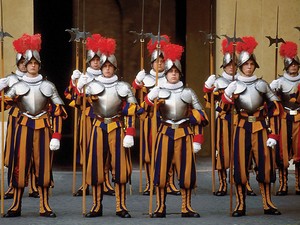 Quattro giorni prima, i mass medi mondiali avevano presentato parte dell’intervista da CBS al 270esimo successore di Sant’Andrea sul trono di Costantinopoli (attuale Istanbul) che fu per secoli il più “rispettato” e influente leader del mondo cristiano, anche più della sua “controparte” occidente a Roma. Le relazioni tra i due che servono le due più antiche e storiche chiese del mondo cristiano sono condotte con reciproco rispetto e buona volontà, pur nell’evidenti differenze dogmatiche che hanno tormentato e molto diviso la cristianità durante secoli.
Quattro giorni prima, i mass medi mondiali avevano presentato parte dell’intervista da CBS al 270esimo successore di Sant’Andrea sul trono di Costantinopoli (attuale Istanbul) che fu per secoli il più “rispettato” e influente leader del mondo cristiano, anche più della sua “controparte” occidente a Roma. Le relazioni tra i due che servono le due più antiche e storiche chiese del mondo cristiano sono condotte con reciproco rispetto e buona volontà, pur nell’evidenti differenze dogmatiche che hanno tormentato e molto diviso la cristianità durante secoli.
Quando l’attuale successore di San Pietro fu eletto Papa nell’anno 2005, solo alcuni notarono che il suo primo viaggio ufficiale fu a Costantinopoli (l’attuale Istanbul appunto), per fare una visita ed onorare il Patriarca. Fu, il suo, un gesto molto simbolico per due ragioni : la prima, perché dava importanza all’unita delle due chiese e la secondo perché esaltava il calibrato spirito dell’arcivescovo dimenticato e sofferente, che ha accolto il Papa Benedetto 16esimo.
Sua Santita, l’ecumenico (Universale) Patriarca Bartolomeo che rappresenta più o meno 300,000,000 cristiani ortodossi in tutto nel mondo fu intervistato da Bob Simon, uno dei più eminenti giornalisti degli Stati Uniti. Proclamando a lui, tutta la sua ansia nei confronti delle condizioni sociali e politiche opposte che hanno costantemente e volontariamente mutilato l’istituzione del Patriarcato ecumenico in Turchia, che già preesisteva molto prima della fondazione della Turchia moderna e persino dell’una volta impero ottomano.
Sua Santità, il Patriarca Bartolomeo, uno dei leader tra i più oppressi fra i leaders religiosi è costretto, attualmente, in una zona di meno un acro di terra circondato da fili di ferro per la sua sicurezza contro gli insulti e messaggi di minaccia di vita che riceve ogni giorno.
La sua permanente ed ansiosa richiesta allo stato turco, riguarda l’apertura della scuola teologica di Halki che legittimamente appartiene ai patriarchi. Quella apertura produrrebbe una fiumana di nuovi clericali che sono assolutamente necessari per la sopravvivenza della comunità cristiana locale e per la continuità dell’istituzione del patriarcato cristiano a Costantinopoli. La scuola teologica di Halki è vitale per la minoranza dei greci-bizantini cristiani, meno di 3.000 persone. In particolare tra i suoi principiali obiettivi: la preparazione spirituale e accademica dei clericali che più tardi andranno a servire come arcivescovi locali e che forse costituiranno il vivaio di candidati per l’elezione del prossimo Patriarca che, secondo la legge turca, deve essere un cittadino turco (i vescovi ortodossi cristiani di altre nazionalità non possono essere eletti).
In altre parole, l’ufficiale chiusura della scuola Halki imposta dalle autorità turche nell’ anno 1971 ha avuto gli stessi effetti disastrosi per la chiesa ortodossa che si potrebbero avere se il Vaticano fosse, per avventura, privato del suo collegio di Cardinali.
La componente greco-bizantina di Costantinopoli (riconosciuta come una minorita etnica dal trattato di Losanna) continua a ridursi in un modo preoccupante (a causa della pratica di pulizia etnico/culturale applicata nel 20esimo secolo), ma mai si abbandona la lotta per la sopravvivenza, o per mantenere in vita il suo glorioso passato medievale che ha molto aumentato le prospettive culturali e scientifiche delle società occidentali ed europee, durate ben oltre il Medioevo.
La comunità cristiana bizantina attraverso il suo reverendissimo membro, invia un vero e proprio messaggio di “SOS”, chiaro al mondo e al governo turco. E probabilmente l’ultimo e disperato tentativo del leader modesto e sacro di una chiesa, per difendere il suo gregge cristiano e mantenere in vita la tradizione della chiesa ortodossa sacra in uno dei suoi territori d’origine. Una parte della stampa turca ha già approvato, con sincera simpatia, il grido disperato del Patriarca ecumenico che è, fra l’altro, un cittadino turco che ancora rimane prigioniero nel suo paese di
nascita.
Il suo appello disperato e le sue dichiarazione pubbliche, secondo le quali è trattato come un cittadino di seconda classe e “crocifisso” dalle Autorità, deve essere preso sul serio in un periodo dove in paesi europei come la Svizzera si sono organizzati dei referendum contro i diritti dei musulmani a edificare minareti all’ intorno del loro territorio, quasi a voler porre delle barriere alla libertà di culto.
Sembra, sfortunatamente, che non ci siano guardie svizzere per la protezione del Patriarca “crocifisso” che lo proteggano dall’ingiusto trattamento imposto da uno stato moderno e secolarizzato, che per decine di anni si è impegnato a farsi accettare ed accreditare come candidato o membro dell’ Unione Europea.
Relevant websites:
http://patriarchate.org/
http://en.wikipedia.org/wiki/Patriarch_Bartholomew_I
http://it.wikipedia.org/wiki/Bartolomeo_%28patriarca_di_Costantinopoli%29
http://fr.wikipedia.org/wiki/Bartholom%C3%A9e_Ier_de_Constantinople
Photos : The Ecumenical Patriarch Bartholomew with
1) Pope Benedict 16th during his visit in Constantinople (2005)
2) Patriarch Kirill of Moskow and all Russia in Constantinople (2009)
3) President Barack Obama in Washington (nov. 2009)



